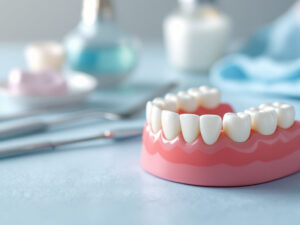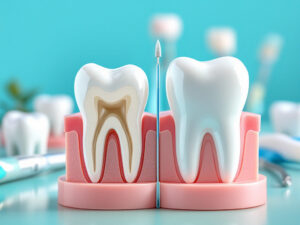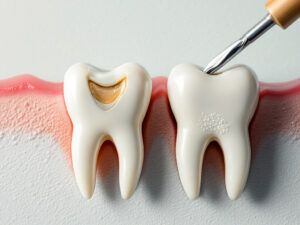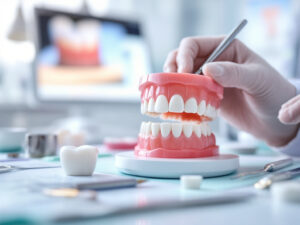If you experience sharp, fleeting pain when sipping hot coffee or enjoying an ice‑cold treat, you are not alone. Millions of individuals in the United States deal with tooth sensitivity every day, often unsure where to turn for a lasting solution. Fortunately, tooth sensitivity treatment offers hope and relief, ensuring you can return to enjoying your favorite foods and beverages without constant worry. At Cloninger Dentistry, we understand that addressing tooth sensitivity means looking beyond discomfort. It is about restoring your sense of well‑being, preserving your oral health, and ensuring you have a positive, supportive environment for all your dental needs.
Tooth sensitivity arises when the protective outer layer of your teeth, known as enamel, wears down or when the gums recede, exposing the deeper layer called dentin. This exposure often triggers discomfort whenever you eat, drink, or even brush your teeth, sometimes intruding on your daily life. By seeking help and exploring proven treatment options, you empower yourself to tackle these unique challenges head‑on. Below, you will find comprehensive insights on how to recognize tooth sensitivity, understand its causes, and pursue effective solutions. Our compassionate, knowledgeable approach will guide you toward meaningful relief, helping you protect the healthy smile you deserve.
Understanding tooth sensitivity
Tooth sensitivity, also referred to as dentin hypersensitivity, is best described as short, abrupt bursts of pain or discomfort that occur when your teeth come into contact with something particularly cold, hot, sweet, or acidic. This response happens because the delicate tubules within your dentin carry temperature or chemical stimuli directly to the tooth’s nerves. When enamel or gum tissue no longer protects vital parts of your teeth, these nerves react, sometimes causing a sharp tingle or an ache that can linger.
The scope of tooth sensitivity can vary widely. Some people may experience mild twinges of pain that come and go, while others might feel more persistent and intense sensations that interfere with day‑to‑day activities such as brushing, flossing, or eating. According to the Academy of General Dentistry, around 40 million individuals experience tooth sensitivity in some form (Healthline). In fact, sources like Cleveland Clinic mention that as many as one in eight adults could be dealing with this issue. If you find yourself constantly changing your dietary habits or shying away from cold drinks to avoid pain, it is time to explore tooth sensitivity treatment.
How sensitivity impacts daily life
Apart from the discomfort, sensitive teeth can create emotional and practical challenges. You might feel anxious at the thought of an upcoming meal with friends or dread your morning coffee because of the inevitable jolt of pain. This can affect routines you once took for granted. Activities like brushing and flossing might become less thorough due to fear of discomfort, which can further compromise your overall oral health. An essential part of tooth sensitivity treatment is recognizing both the physical and emotional burdens it can impose, then finding strategies to cope with and alleviate them.
Embracing a supportive environment
At Cloninger Dentistry, we emphasize a welcoming, compassionate atmosphere as you seek a solution for tooth sensitivity. We believe in tailoring our care to your specific needs, ensuring that every consultation, examination, and treatment resonates with empathy, expertise, and understanding. Our approach prioritizes “comprehensive care” and “individualized plans,” so you receive the support necessary for lasting relief. Whether it is during a routine dental checkup or a more specialized visit, you will discover a team that is determined to help you feel at ease.
Exploring causes and challenges
Many factors contribute to tooth sensitivity, often working in combination. Understanding them can help you and your dental professional pinpoint the best tooth sensitivity treatment approach.
Common causes of sensitivity
- Enamel wear and tear: When enamel is eroded, the dentin below becomes more susceptible to temperature or chemical irritants. High‑acid diets, aggressive brushing, and teeth grinding can speed enamel loss.
- Gum recession: Gums protect the tooth roots, which, unlike crowns, do not have a protective enamel layer. If your gums recede because of gum disease or improper brushing, tooth roots become exposed.
- Dental procedures: Following treatments like fillings or root canals, you might experience temporary sensitivity. Usually, these transient aches subside on their own, but persistent pain can signal another issue.
- Cavities and cracks: Cavities or microcracks allow temperature or food particles to reach the sensitive parts of the tooth, causing pain. According to Mayo Clinic, cavities and chipped teeth are frequent culprits for lingering discomfort.
- Inflammatory conditions: Gum disease (or periodontal disease) frequently leads to gum recession, enabling more direct access to tooth nerves. Left untreated, inflammation can also pave the way for infections and more severe complications, underscoring the importance of timely gum disease treatment.
Aggravating factors
If you notice tooth sensitivity intensifying in specific circumstances, it may be due to triggers like:
- Hot or cold food and drinks (coffee, tea, ice water)
- Sweets and acidic foods (citrus fruits, tomatoes)
- Overzealous brushing
- Teeth whitening products or procedures
- Wear from clenching and grinding your teeth
All these factors can worsen sensitivity, making it even more pivotal for you to consider a targeted tooth sensitivity treatment plan that addresses your lifestyle, dietary patterns, and oral hygiene habits.
Unique challenges in maintaining oral health
When you suffer from tooth sensitivity, even routine oral care can feel daunting. You might avoid flossing thoroughly around the gum line to sidestep pain, or perhaps you refrain from scheduling regular professional teeth cleaning out of fear of discomfort. This is where a supportive environment can be particularly essential. At Cloninger Dentistry, our team is trained to help you navigate these hurdles with techniques that protect vulnerable areas of your teeth. We want to ensure you have the “support necessary for lasting recovery”—or, in this context, lasting relief—by offering personalized recommendations and step‑by‑step guidance for your specific situation.
Strengthen enamel and prevent sensitivity
One strong protective measure is to preserve that outer enamel, preventing premature erosion and reducing the likelihood of sensitivity. A sound prevention strategy involves day‑to‑day habits that fortify your teeth and make them less prone to pain.
Daily habits to safeguard enamel
- Brush gently with a soft‑bristled toothbrush to prevent unnecessary friction that wears down enamel. Aggressive brushing is a common cause of enamel erosion.
- Use desensitizing or fluoride‑rich toothpaste as suggested by your dentist. Fluoride helps strengthen weakened teeth and can help address mild sensitivity. For additional enamel reinforcement, a fluoride treatment in the dental office may provide more targeted protection.
- Floss carefully every day. Thread the floss gently between teeth instead of snapping it down, which might irritate gums.
- Rinse or drink water after consuming acidic items such as soda, citrus, or wine. Water helps dilute and clear away acid that can erode enamel.
- Limit excessive intake of sugary treats. Sugar feeds harmful bacteria in your mouth, contributing to plaque buildup and potential enamel damage.
Regular checkups and professional oversight
Routine visits to the dentist serve as a cornerstone in monitoring enamel health. During a thorough routine dental checkup at Cloninger Dentistry, we evaluate the condition of your teeth, detect early signs of erosion, and recommend protective measures to keep your enamel intact. If sensitive, inflamed gums are present, we may advise periodontal maintenance cleaning or gum disease treatment. Each interaction is customized to reflect your personal needs, ensuring you receive “individualized plans” and a “supportive environment.”
Addressing grinding and other stressors
If you grind or clench your teeth—often referred to as bruxism—you risk hastening enamel erosion and aggravating sensitivity. A custom mouthguard might be recommended to protect your teeth from undue pressure while you sleep. Discussing stress management strategies, adjusting your sleep position, and improving your overall health can also help reduce grinding episodes. Our objective is to help you avoid preventable enamel wear and ensure that tooth sensitivity does not overshadow your daily routine.
Evaluate treatment options
When sensitivity persists despite preventive efforts, a focused tooth sensitivity treatment plan can help you get back to normal function and comfort. Dentists often rely on a mix of home remedies, professional interventions, and long‑term care to reduce discomfort.
Home remedies for initial relief
While you should always seek professional guidance if tooth sensitivity disrupts your life, at‑home options can offer initial relief when mild discomfort sets in:
- Desensitizing toothpaste: According to Westgate Dental Care, these formulas contain potassium nitrate or stannous fluoride that help block pain signals between your tooth’s surface and the nerves inside. Regular usage can reduce sensitivity over time, but if pain lingers, seeing a dentist is recommended.
- Saltwater rinses: A straightforward approach involves dissolving half a teaspoon of salt in a glass of warm water and rinsing for around 30 seconds. This can reduce inflammation, as noted by Healthline.
- Clove or coconut oil: Dabbing a small amount of diluted clove oil on a cotton swab, or practicing oil pulling with coconut oil for 10‑15 minutes, may temporarily soothe sensitive areas (Smile Arizona Dentistry).
Though these home remedies can lessen discomfort, they do not typically address the underlying causes. If the sensitivity does not improve or gets worse, proceed to a professional evaluation.
Professional interventions
Depending on the nature of your tooth sensitivity, professional care can involve multiple procedures or therapies:
-
Dental sealants or bonding
A protective layer can be applied to exposed dentin or root surfaces, reducing the flow of sensations to the tooth nerve. -
Fluoride treatments
In‑office fluoride treatment replenishes minerals and strengthens enamel, helping to shield tooth surfaces from painful triggers. -
Periodontal treatment
If gum recession is the prime culprit, addressing any underlying gum disease is vital. A combination of scaling, root planing, and gum disease treatment can help restore gum health and minimize future recession. -
Crowns, inlays, or bonding for advanced cases
If tooth damage from wear, decay, or cracks is significant, dental crown placement might be recommended to protect the tooth structure. Crowns and inlays reinforce damaged areas while alleviating extreme sensitivity. -
Root canal therapy
In more severe or persistent cases, such as when the pulp of the tooth becomes inflamed or infected, root canal therapy removes the compromised pulp and seals the tooth to prevent further discomfort. According to Cleveland Clinic, root canals may help when sensitivity becomes chronic and other options are ineffective.
Matching treatment to your needs
Cloninger Dentistry prioritizes tailored treatment programs. We believe in “comprehensive care” that explores the unique challenges of each tooth sensitivity case. During your visit, we evaluate the extent of enamel loss, gum recession, or any other underlying conditions like cavities or fractures, then recommend a method that aligns with your comfort level and long‑term health. For example, if you have mild to moderate sensitivity, we might suggest a combination of in‑office fluoride applications and specialized toothpastes. On the other hand, if you have visible cracks or advanced decay, a more involved treatment such as tooth extraction service or root canal therapy could be necessary. Our goal is to create a plan that meets your immediate and long‑term needs so you can experience relief that lasts.
Choose Cloninger Dentistry for comprehensive care
Opting for a provider to address your tooth sensitivity can be a deeply personal decision. At Cloninger Dentistry, we are dedicated to meeting your family’s preventative hygiene and cosmetic dentistry needs in an environment where you feel empowered and heard. Here’s why we stand out.
Emphasis on individualized plans
Our compassionate team invests the time to assess the specifics of your situation. Whether you need immediate pain relief, advice on refining your at‑home routine, or advanced interventions, our “tailored treatment programs” aim to achieve results that are both practical and sustainable. Because every person’s oral health journey differs, we calibrate our strategies to respect your comfort level and lifestyle. You might come in for a private dental consultation to discuss your application of a desensitizing toothpaste, or to plan a more in‑depth procedure. Either way, you can trust that your care plan is fully customized.
Comprehensive family and cosmetic services
We recognize that tooth sensitivity is only one piece of the bigger puzzle in maintaining optimal oral health. That is why we offer a variety of services designed for individuals of all ages, including pediatric dental care for children in your household, oral cancer screening for early detection, and a variety of cosmetic procedures such as porcelain crown service or dental bridge placement. Our commitment to “comprehensive care” ensures your family’s dental needs are covered, from preventive checkups to cosmetic touch‑ups, all under one roof.
Supportive environment built on trust
In line with our core principle of creating a “supportive environment,” our clinic spaces and interactions are designed to minimize stress and maximize peace of mind. The moment you step in, we aim to put you at ease, ensuring each question you have about tooth sensitivity treatment is met with consideration and clarity. Our staff prioritizes open communication, providing transparent cost estimates and flexible scheduling to accommodate your needs. Through transparent dental pricing practices and flexible financing dental options, we do our best to remove barriers between you and the necessary care you deserve.
Your partner in prevention
We want you to feel confident every time you climb into the dental chair, knowing that your concerns matter. Tooth sensitivity often requires ongoing management to ensure that improvements are maintained. Regular follow‑up appointments help track significant changes in enamel, gum health, or alignment issues that might flare up. Much like a “written treatment estimate” (/written-treatment-estimate) can keep you informed about financial planning, consistent checkups keep you informed about the evolving condition of your teeth, putting you in the driver’s seat of your oral health journey.
Address common questions
Below, we provide answers to common questions surrounding tooth sensitivity treatment. These FAQs encompass daily prevention tips, procedural considerations, and guidance on when to seek professional care.
What causes tooth sensitivity?
Tooth sensitivity often results from exposed dentin, the tooth layer beneath your enamel. Causes range from enamel erosion due to acidic foods, aggressive brushing, or teeth grinding, to gum recession that uncovers root surfaces, to dental damage such as cavities or cracked fillings. If you suspect any of these issues, contact your dentist for an evaluation. Identifying the root cause is the first step toward a solution.
Will dental procedures worsen my sensitivity?
Most dental procedures aim to reduce, not worsen, tooth sensitivity. It is common to experience temporary sensitivity after treatments like fillings or crowns, but that feeling usually subsides within days or weeks. In some cases, such as gum disease or advanced decay, certain interventions (like root canal therapy or dental crown placement) are necessary to protect nerves and ensure long‑term relief. Always communicate your concerns to your dental team so they can adjust treatments accordingly.
How can I manage at‑home discomfort?
Start with a soft‑bristled toothbrush and desensitizing or fluoride‑fortified toothpaste. If you notice improvement, continue with daily flossing, gentle brushing, and mindful dietary choices to limit enamel erosion. You can incorporate a saltwater rinse in the morning and evening. Simple measures such as using a straw for acidic beverages and drinking plain water afterward work wonders in preventing further enamel damage.
Are there permanent solutions for tooth sensitivity?
Many cases of tooth sensitivity can improve or resolve with proper treatment and lifestyle adjustments. In advanced situations, long‑term solutions might include crowns, bonding, or even surgical gum procedures, especially when recession severely exposes tooth roots. Regular checkups and consistent care play a crucial role in determining if you might benefit from permanent restorations or ongoing preventive adjustments.
When should I see a dentist about tooth sensitivity?
Seek professional guidance if your tooth sensitivity:
- Persists for more than a few weeks
- Interferes with your usual eating or oral hygiene habits
- Involves sharp or worsening pain
- Accompanies swelling, bleeding gums, or visible damage
Your dentist can determine if you need immediate intervention, such as gum disease treatment or further evaluation for underlying issues. Early management can prevent more severe complications down the line.
Summarize your path forward
Living with tooth sensitivity can affect everything from your morning coffee routine to your evening meal with loved ones, but it does not have to stay that way. Reliable tooth sensitivity treatment strategies allow you to embrace the foods and drinks you love, refocus on maintaining excellent oral health, and do so with fewer daily disruptions. From gentle brushing techniques and special toothpaste formulas to professional interventions like fluoride applications or dental crowns, each step you take forms part of a holistic, empowering journey toward comfort and well‑being.
Choosing Cloninger Dentistry as your partner in family dental care, preventive hygiene, and cosmetic solutions means you have a team that understands your experience of tooth sensitivity. We aim to deliver the “supportive environment,” “comprehensive care,” and “individualized plans” needed to reduce discomfort, preserve your teeth, and instill the confidence that comes from a healthy, pain‑free smile. By working closely with our dedicated professionals, you gain access to effective methods and resources to reclaim the delight in eating and drinking—without the momentary ache that once stood in your way. Relief is just a visit away, and we look forward to helping you achieve lasting comfort every step of the way.










